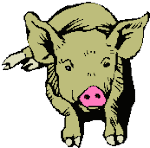This seems to settle the matter MRSA spreads from pig herd to pig herd, the larger the herd the more likely they have MRSA.
Most herds had MRSA and if the trend continued to the present day, all herds in Holland now have MRSA.
It seems impossible when almost the whole world has MRSA in its pigs, that Britain believes she remains MRSA free, thanks to the brilliance and integrity of her dedicated veterinary surgeons.
Their veterinarians have told them so in many words, in many places, over many years, whilst stuffing the pigs with antibiotics in order to keep them alive long enough to get them to Britain's dining tables.
The Dutch come out of this well: Britain's vets have questions to answer.
Access to the abstract and the full report here.
Prev Vet Med. 2011 Jul 4. [Epub ahead of print]
Prevalence and risk factor analysis of livestock associated MRSA-positive pig herds in The Netherlands.
Source
Quantitative Veterinary Epidemiology Group, Wageningen Institute of Animal Sciences, Wageningen University, P.O. Box 338, 6700 AH Wageningen, The Netherlands; Centre for Infectious Disease Control Netherlands, National Institute for Public Health and the Environment, P.O. Box 1, 3720 BA Bilthoven, The Netherlands.
Abstract
In 2005, methicillin-resistant Staphylococcus aureus was found in pig herds and in humans in contact with pigs. To determin e the prevalence of, this now-called livestock-associated (LA) MRSA among pig herds in the Netherlands and to identify and quantify risk factors, an observational study of 202 pig herds was performed between 2007 and 2008. Five environmental wipes and 60 nasal swabs from each herd were collected, and microbiological analysis was performed on single environmental samples and pooled nasal samples. A herd was considered MRSA-positive if ≥1 sample tested positive. The prevalence of MRSA-positive herds was 67% in breeding herds and 71% in finishing herds. Multivariable logistic regression analysis was then performed on data from 171 breeding herds. The number of MRSA-positive herds increased from ∼30% at the start to ∼75% at the end of the study, most likely due to transmission between herds. The prevalence of MRSA increased with herd size, as ∼40% of smaller herds (<250 sows) were MRSA-positive compared to >80% of larger herds (>500 sows). Other risk factors (e.g. antimicrobial use, purchase of gilts and hygiene measures) were not significantly associated with MRSA, though associated with herd size. Herd size appeared to be a compilation of several factors, which made larger herds more often MRSA positive....
Copyright © 2011 Elsevier B.V. All rights reserved.
PMID:
21733585
[PubMed - as supplied by publisher]
